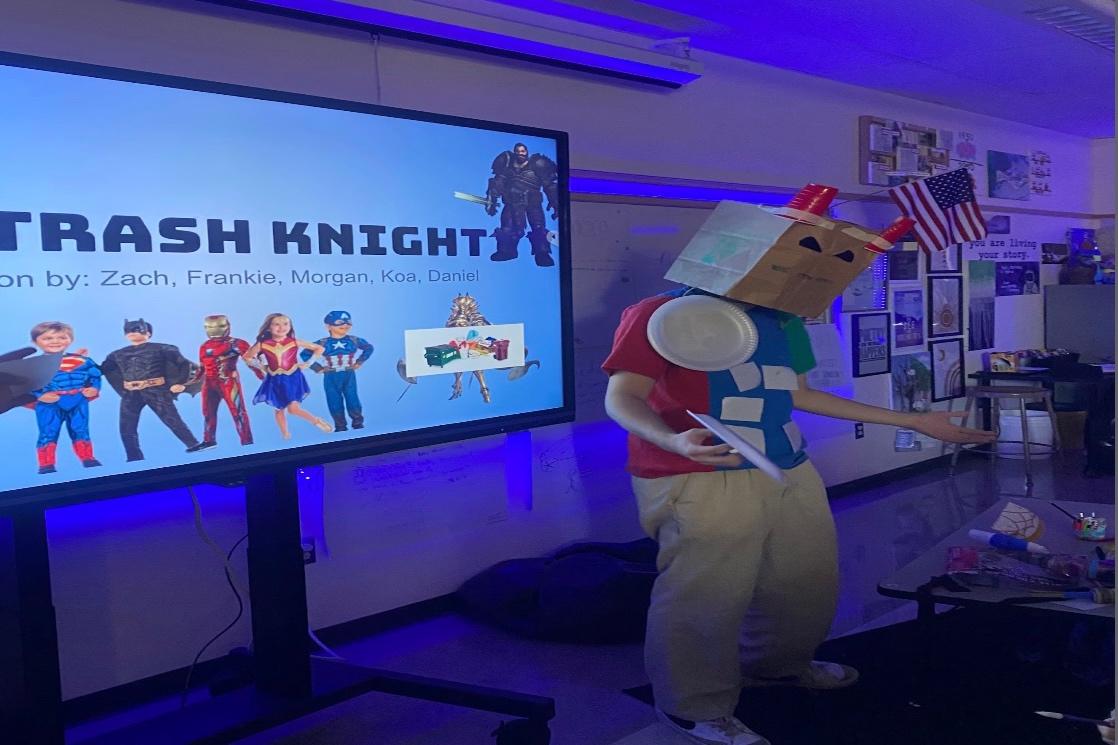By Sam Ekstedt
Dec 4th, 2023
If you have existed during the past century, it is guaranteed you know how prevalent and all-encompassing the Climate Change Crisis is. The generations that are supposed to be the future are rapidly losing hope in the stability of that very future. Who can blame them when they have grown up inundated with information and news about how their planet is boiling? But, the fight against Climate Change is not as one-sided as many would lead you to believe. Good people are out there and great changes are happening, but negativity often overshadows the positive. Anything to shed light on the good happening in the world is direly needed to inspire more people into action.
HBHS’ Mrs. Harshman, inspired by a course she taught in college, wrote a new curriculum for a fresh take on an English class: Environmental Literature. For Mrs. Harshman, who practically grew up outside in nature, creating a class that centers around Literary Ecocriticism was the natural progression for her as an English teacher. When asked what she hoped to achieve by building this new curriculum, she said, “I want them to be strong communicators, readers, and writers, but I also hope they find their place within the environmental conversation. I know not everyone is going to be a crazy wild environmentalist, but if they can care a little bit more and find ways to incorporate nature into their lives, it can give them a purpose and more hope for their future.”
Mrs. Harshman encourages her students to think critically about their footprint on the environment and what they can do to be a part of the solution. “I’ve started to get rid of a few of my wasteful habits after learning how harmful they can be to the environment. Before taking this class, I didn’t realize how damaging Starbucks is for our environment. Once you’re done with your drink, you can just recycle the cup, right? Wrong. You have to remove the sticker and wash out the cups and make sure there are no remnants (drink or food) left…” explained Annabelle Mai, a senior currently taking Mrs. Harshman’s Environmental Literature Class.
 Environmental Literature students use trash they've collected from their daily lives to create imaginative products.
Environmental Literature students use trash they've collected from their daily lives to create imaginative products.While Mrs. Harshman has compiled dozens of interesting literary and art resources that all touch on fascinating aspects of the environmental conversation and projects that aim to change how students approach the issue, Environmental Literature’s positive impact on students’ lives extends beyond the classroom. You have probably seen them on campus: groups of students taking out the recycling from your classes and disposing of them properly in the huge recycling bins. Those are Mrs. Harshman’s Environmental Literature students getting outside and completing some of their required volunteer hours. They collect bottles and cans to trade in for money that goes back into the school. Recycling around campus is just the tip of the iceberg of what the Environmental Literature students are doing.
Many volunteer outside of school with incredible organizations like Algalita and the HB Wetlands Conservancy, actively working to improve the community. Mrs. Harshman herself partners with many local organizations, organizes events and writes letters for local volunteer opportunities, participates in as many beach clean-ups as she can attend, and even organizes a neighborhood market where her neighbors can trade what food they grow in their backyards. She says, “The volunteer hours are the most crucial. The whole idea is that the things that we’re learning in our classroom, we can see them happening in the real world.” Many of her students say they plan to continue volunteering after this class and they are not alone.
Regarding the positive impact this class has on her students every year, Mrs. Harshman said, “I really feel like I learn from my students just as much as they learn from me. The fact that they have any interest in making the world a better place is just the best thing ever. When I see those lightbulbs go off, they get excited about something, or passionate about a topic and want to continue learning that as a career in the future; I couldn’t ask for more. It’s the best.”

The future is scary. There is no way around the fact that the planet is in danger, but these small wins are the grains of rice that will eventually tip the scale. After taking Environmental Literature, Senior, Arian Chloe Talavera said, “I believe we have hope for our future and the planet. We need to tell stories of how humanity can make a change instead of overwhelming them with statistics. This is cliche, but the littlest acts can make a difference…” Here at HBHS, students are being built up to actively participate instead of just being in the audience unable to do anything but watch as the story unfolds. Mrs. Harshman puts the effect of that relentless fear and hopelessness many feel perfectly, “I think it’s very real. I think it’s something we all feel. I feel like your generation, especially, is so inundated with information, which can be wonderful, but it can also be really damaging and overwhelming… with all of you, it’s just thrown at you all the time, and so it’s really hard to see any glimmers of hope. That’s essentially what my goal with this class is. It isn’t hopeless, and we have amazing humans out there that can do wonderful things.”
Do something to fight for your future. Check out Environmental English, and do not be afraid to look into volunteer opportunities in your community. The hope is out there; you simply must look for it.
